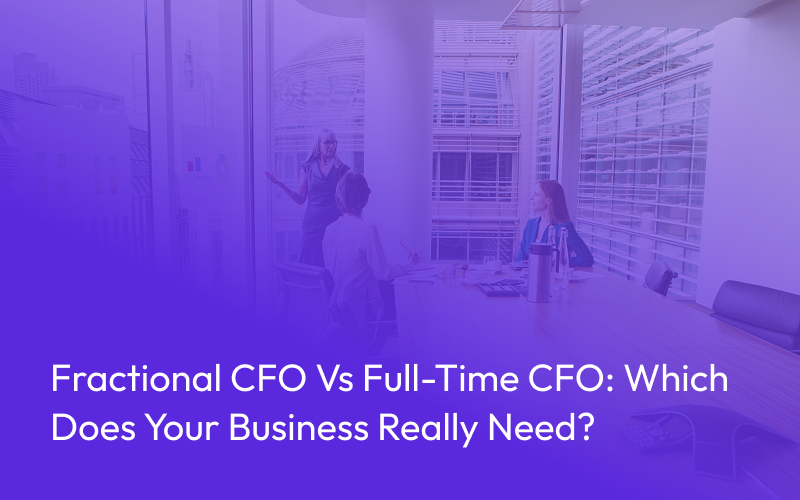Most business owners ask the wrong question when it comes to financial leadership.
They ask, “Can I afford a CFO?”, when what they should be asking is, “What’s the cost of making another quarter of financial decisions without strategic insight?”
I’ve watched too many capable business owners stumble because they either waited too long to get serious financial help, or they hired the wrong type of financial leadership at the wrong time.
The choice between a fractional CFO and a full-time CFO isn’t really about money. Sure, money matters. But it’s actually about getting the right expertise. At the right time. In the right way.
And frankly, most of the owners of service businesses in the $1M–$10M range I work with are getting this decision wrong.
So how do you make the right decision between choosing a fractional CFO and a full-time CFO? Let’s get into the details.
What Actually Is a Fractional CFO?
Let me clear something up right away. A fractional CFO isn’t a bookkeeper with a fancy title. They’re not some consultant who shows up, delivers a PowerPoint, and disappears.
A fractional CFO is a senior financial executive, one who’s been a real CFO before, who works with your business part-time, usually 10-20 hours per week. They handle the same strategic financial work as a full-time CFO, just without sitting in your office 40 hours a week.
I started offering fractional CFO services because I kept meeting business owners who needed real financial strategy but couldn’t justify (or didn’t want) a full-time executive on payroll.
Here’s what a good fractional CFO actually does:
- Builds financial forecasts that help you make decisions, not just track what happened
- Manages cash flow so you stop worrying about making payroll
- Creates KPI dashboards that show you what’s actually driving profit
- Handles tax planning before it becomes a crisis
- Guides you through raising capital or preparing for exit
- Fixes the financial mess that’s been keeping you up at night
The difference between this and traditional CFO work? We focus purely on the high-impact stuff. No administrative busy work. No managing AP clerks. Just strategic financial leadership.
Why Fractional CFOs Work Better (For Most Businesses)
1. You Get Senior Expertise Immediately
Onboarding a qualified fractional CFO can start making an impact within days. No six-month recruiting process. No onboarding period. No hoping you hired the right person.
Here’s the thing about traditional hiring: By the time you complete the entire recruitment process, you’ve burned through a quarter or more without the strategic insight you desperately need.
With fractional engagement, you skip all that noise. The person you’re working with has already proven themselves with other businesses. They know what good financial systems look like, they’ve seen your problems before, and they can start solving them immediately.
2. Unbiased Strategic Guidance
Fractional CFOs, being someone from outside your business, can deliver candid assessments of business performance. No holdbacks, only honest and objective feedback.
Through their impartial strategic guidance, key stakeholders can make more strategic decisions and meaningful business improvements.
“If I wasn’t hitting the numbers, they didn’t just shrug. They gave me fresh strategies, alternative ideas, and guidance on what needed to change. That’s what made all the difference. It wasn’t just accountability, it was direction and encouragement.”
3. Scalable Financial Leadership That Grows With Your Business
Fractional CFO services adjust to your business needs, whether you’re expanding rapidly or streamlining operations.
For example:
- If you need basic strategic planning, you can start with 10 hours per month
- If you business gets more complex, scale up to 20-30 hours
This approach lets you access the right level of financial leadership at each growth stage without over-investing early or under-investing as you scale. You’re free of lengthy contracts. You can exit anytime. You can scale the services you get on your own terms.
What About a Full-Time CFO?
A full-time CFO is a senior financial executive who works exclusively for your company. They’re typically earning a median annual salary of $313,000, and they’re handling both strategic work and day-to-day financial operations.
I’ve been a full-time CFO. It made sense for the companies that hired me because they had complex operations, multiple locations, big teams, and needed someone managing financial operations every single day.
Full-time CFOs handle everything, including:
- Strategic planning and forecasting
- Team management and development
- Daily operational oversight
- Board meetings and investor relations
- Crisis management and immediate consultation
- Long-term institutional knowledge building
The full-time model works great when you actually need 40+ hours per week of senior financial leadership.
When Full-Time CFOs Make Sense
Look, I’m not going to sugarcoat this. Hiring a full-time CFO is expensive. It’s a commitment that most businesses between $1M-$10M in revenue can’t justify, and frankly, shouldn’t attempt.
But there are specific situations where it makes perfect sense.
1. Daily Complex Operations
Some businesses generate constant financial decisions. Real-time cash flow management needs. Operational challenges that demand immediate expert attention.
If your business operates in an environment where financial decisions happen hourly instead of weekly, you need someone there. Manufacturing with complex supply chains. Multi-location service businesses with intricate cost structures. Companies managing significant inventory or equipment financing.
This isn’t about having someone to run reports. It’s about having strategic financial leadership embedded in daily operations, preventing costly delays, and maintaining operational efficiency across all business functions.
2. Large Team Management
Here’s where fractional CFOs hit their limits. We excel at strategic guidance, forecasting, and high-level financial analysis. But we’re not managing day-to-day operations with 50+ person teams.
A full-time CFO can provide hands-on attention to organizational and financial issues. They’re managing finance teams, overseeing complex payroll structures, and handling the operational side of rapid scaling.
If you’re running a business with multiple departments, complex org charts, and operational challenges that require daily financial oversight, fractional becomes insufficient.
3. Board and Investor Relations
Active investor relationships and regular board engagements demand consistent financial representation. Investors value building long-term relationships with the same financial leader who understands their concerns and communication preferences.
Monthly board meetings, investor updates, and exit preparations require deep institutional knowledge and ongoing relationship management. This goes beyond quarterly presentations. It’s about being the consistent financial voice of your business.
If you’re preparing for acquisition, managing active investor relationships, or have board obligations that require regular financial representation, a full-time CFO becomes critical.
4. Revenue and Complexity Thresholds
Organizations reaching $15-$20 million in revenue with complex operations typically generate sufficient strategic financial work to warrant full-time executive attention.
At this scale, you’re facing intricate capital allocation decisions, sophisticated financial planning requirements, and comprehensive risk management needs. The volume and complexity of financial initiatives justify dedicated leadership. This isn’t just about revenue size. It’s about operational complexity.
Core Differences: Fractional vs Full-Time CFO
1. Time Allocation and Focus
A fractional CFO spends time on strategic, high-impact activities. No administrative tasks. No routine operational oversight. We focus exclusively on the decisions and analysis that drive growth and profitability.
A full-time CFO splits time between strategic work and operational management. They spend significant time on team management, system administration, and routine financial operations that don’t directly impact strategic outcomes.
2. Breadth of Experience
Fractional CFOs work with multiple companies across different industries. This cross-pollination brings insights and solutions that single-company experience cannot provide. We’ve seen how other businesses solve similar problems.
Full-time CFOs develop deep, company-specific knowledge but may lack exposure to different approaches, technologies, or strategies used by other businesses in different sectors.
3. Implementation Speed
Fractional CFOs hit the ground running. We’ve implemented similar systems and processes across multiple businesses. We know what works and can deploy proven solutions immediately.
Full-time CFOs may need time to learn your business, understand your industry, and develop solutions from scratch.
4. Cost Structure
This is where the math gets interesting:
- A fractional CFO typically costs $8K-$15K per month, depending on scope and complexity of work. No benefits, no equity, no overhead.
- A full-time CFO costs $300K-$600K annually.
In contrast to working with a fractional CFO where you pay a fixed fee, hiring a full-time CFO involves paying for their salary, benefits, equity, office space, technology, and other overhead expenses.
Which Choice Makes Strategic Sense?
After working with hundreds of businesses, here’s my honest assessment:
Choose fractional CFO if:
- You’re doing $1M-$10M in annual revenue
- You need strategic financial guidance more than daily operational oversight
- You want to optimize profitability without adding overhead
- You’re preparing for growth, fundraising, or major strategic moves
- You value proven solutions over experimental approaches
- You want immediate access to senior expertise
Choose full-time CFO if:
- You’re over $15M with complex daily operations
- You need someone managing financial teams and processes full-time
- You have active board/investor relationships requiring consistent representation
- Your business model requires constant financial analysis and real-time adjustments
- You have the complexity and budget that justifies the investment
Making the Right Decision for Your Business
I’m not saying fractional CFOs are always the right answer. I’ve recommended full-time hires when it made sense for the business.
But for most business owners I work with, the fractional model provides better value, faster results, and smarter capital allocation.
Case in point: One of our clients, a fast-growing SaaS company with operations in two major countries, came to us upon realizing they’ve outgrown their financial structure. In terms of compliance, they’re doing well. But that’s it. What they’re missing is a clear financial direction.
“Before working with Bennett Financials, we had a solid team but no clear strategy. They brought clarity, structure, and results across both our U.S. and India operations.”
What does this narrative tell us?
You want proven solutions, not experimental approaches. You understand that strategic timing matters in business, and you can’t afford to wait six months for traditional hiring processes when strategic opportunities require immediate action.
The question isn’t whether you need financial leadership. You do. The question is what type of financial leadership serves your business best at this stage.
Tying All Ends
The businesses that scale successfully are those that get the right expertise at the right time and at the right cost structure.
For most growing businesses, that means fractional financial leadership.
Your competitors are figuring this out. The smart money is moving toward flexible, results-focused engagement models.
The question isn’t whether you can afford strategic financial leadership. The question is whether you can afford to keep making financial decisions without it.
Create the Financial Foundation for Your Success
Bennett Financials goes beyond traditional reporting. We transform your financial data into actionable strategic intelligence so you can build confidence in making critical business decisions.Work with a CFO that can scale with your business. Connect with our experts and discover how we can accelerate your growth objectives.


